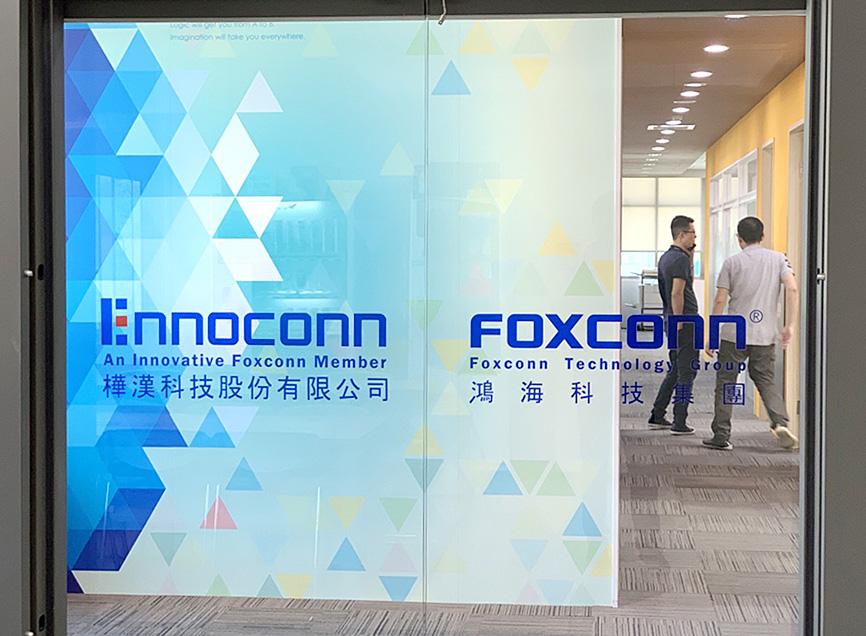Ennoconn Corp (樺漢科技) is confident about its business operations this year, as it expects to continue to benefit from booming artificial intelligence of things (AIoT), 5G, cloud and semiconductor markets, the industrial computer maker said on Friday.
The company expects its design and manufacturing branch to post higher growth this year, while its systems integration segment and brand business should also show stable expansion from last year, it said.
“Judging from orders in hand, the order visibility has extended into next year, which helps the company maintain a double-digit percentage growth rate,” Ennoconn said in a statement.

Photo: CNA
The industrial computer manufacturing arm of Hon Hai Precision Industry Co (鴻海精密) provides hardware solutions for point-of-sale, banking automation, kiosk, lottery and industrial automation systems.
Due to robust development in the AIoT, 5G, cloud and semiconductor industries, European and US clients in the smart retail, finance, gaming and entertainment sectors last year increased their orders of Ennoconn’s industrial Internet of Things and embedded technology products, the company said.
Revenue for last month increased 15.2 percent monthly and 13 percent annually to NT$11.59 billion (US$418.56 million), the company said.
That lifted revenue for the fourth quarter of last year to 26.6 percent from the third quarter, and up 11.7 percent from a year earlier, to NT$29.64 billion, a quarterly record, it said.
Revenue for the whole of last year increased 14.3 percent year-on-year to NT$96.08 billion, also a record, it added.
Ennoconn said it is looking forward to the arrival of a platform for converging technologies that would help expand the scale of its operations.
Looking at trends from the CES trade show that closed on Friday in Las Vegas, the firm said that various brands and supply chain firms are developing new technologies and making progress with cloud services in the metaverse, as well as the fields of low-orbit satellites, 5G and AI.
Ennoconn has worked with Google to launch augmented reality and virtual reality glasses, as well as building cloud platforms for public safety, medical and logistics services. Google last week acquired a 4.6 percent stake in Ennoconn via private placement to become its third-largest institutional investor.
Ennoconn has also partnered with Intel Corp, MediaTek Inc (聯發科), VIA Technologies Inc (威盛電子), Chunghwa Telecom Co (中華電信) and Systex Solutions Corp (精誠資訊) to expand into the cloud-based applications and digital service markets, the company said.
Analysts said that demand for industrial computers has been recovering over the past few months, with major vendors increasing orders despite severe component shortages.
The tight semiconductor component supply is forecast to continue through the first half of this year, but is likely to ease gradually, they said.

IN THE AIR: While most companies said they were committed to North American operations, some added that production and costs would depend on the outcome of a US trade probe Leading local contract electronics makers Wistron Corp (緯創), Quanta Computer Inc (廣達), Inventec Corp (英業達) and Compal Electronics Inc (仁寶) are to maintain their North American expansion plans, despite Washington’s 20 percent tariff on Taiwanese goods. Wistron said it has long maintained a presence in the US, while distributing production across Taiwan, North America, Southeast Asia and Europe. The company is in talks with customers to align capacity with their site preferences, a company official told the Taipei Times by telephone on Friday. The company is still in talks with clients over who would bear the tariff costs, with the outcome pending further

WEAKER ACTIVITY: The sharpest deterioration was seen in the electronics and optical components sector, with the production index falling 13.2 points to 44.5 Taiwan’s manufacturing sector last month contracted for a second consecutive month, with the purchasing managers’ index (PMI) slipping to 48, reflecting ongoing caution over trade uncertainties, the Chung-Hua Institution for Economic Research (CIER, 中華經濟研究院) said yesterday. The decline reflects growing caution among companies amid uncertainty surrounding US tariffs, semiconductor duties and automotive import levies, and it is also likely linked to fading front-loading activity, CIER president Lien Hsien-ming (連賢明) said. “Some clients have started shifting orders to Southeast Asian countries where tariff regimes are already clear,” Lien told a news conference. Firms across the supply chain are also lowering stock levels to mitigate

NEGOTIATIONS: Semiconductors play an outsized role in Taiwan’s industrial and economic development and are a major driver of the Taiwan-US trade imbalance With US President Donald Trump threatening to impose tariffs on semiconductors, Taiwan is expected to face a significant challenge, as information and communications technology (ICT) products account for more than 70 percent of its exports to the US, Chung-Hua Institution for Economic Research (CIER, 中華經濟研究院) president Lien Hsien-ming (連賢明) said on Friday. Compared with other countries, semiconductors play a disproportionately large role in Taiwan’s industrial and economic development, Lien said. As the sixth-largest contributor to the US trade deficit, Taiwan recorded a US$73.9 billion trade surplus with the US last year — up from US$47.8 billion in 2023 — driven by strong

RESHAPING COMMERCE: Major industrialized economies accepted 15 percent duties on their products, while charges on items from Mexico, Canada and China are even bigger US President Donald Trump has unveiled a slew of new tariffs that boosted the average US rate on goods from across the world, forging ahead with his turbulent effort to reshape international commerce. The baseline rates for many trading partners remain unchanged at 10 percent from the duties Trump imposed in April, easing the worst fears of investors after the president had previously said they could double. Yet his move to raise tariffs on some Canadian goods to 35 percent threatens to inject fresh tensions into an already strained relationship, while nations such as Switzerland and New Zealand also saw increased